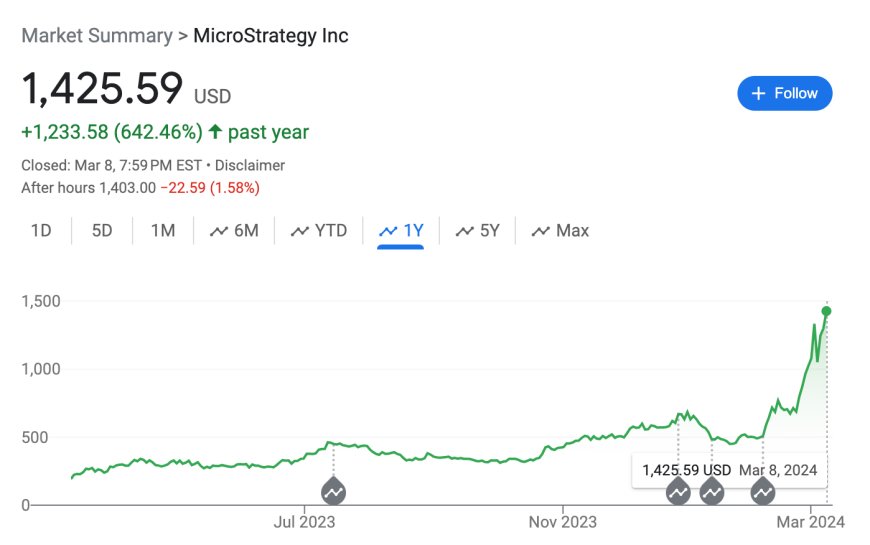BlackRock Bitcoin ETF now holds more BTC than MicroStrategy

Bitcoin, the pioneering cryptocurrency, has been making waves in the financial world, challenging traditional asset classes and gaining recognition as a formidable investment option. In a recent statement, Michael Saylor, the CEO of MicroStrategy, a prominent technology firm, emphasized the technical superiority of Bitcoin over traditional assets such as gold, the S&P 500, and real estate. His unwavering conviction in Bitcoin's potential has led MicroStrategy to embrace a bold "Bitcoin-centric" strategy, positioning the company as a "leveraged Bitcoin ETF" in the eyes of investors.
The Rise of Bitcoin ETFs and Institutional Demand:
The approval of nine new Bitcoin exchange-traded funds (ETFs) by the Securities and Exchange Commission (SEC) on January 10th, 2024, has further fueled institutional interest in the cryptocurrency. BlackRock's spot Bitcoin ETF, IBIT, has outpaced even MicroStrategy's substantial holdings, boasting 197,943 Bitcoin worth over $13.5 billion as of March 8th, 2024. Collectively, the newly launched Bitcoin ETFs hold assets valued at a staggering $28 billion, excluding Grayscale's GBTC, exemplifying the growing institutional demand driving Bitcoin's ascent.
The Bitcoin Price Surge:
The increasing institutional adoption and demand for Bitcoin have propelled its price to new heights. On March 8th, 2024, the cryptocurrency crossed the $70,000 mark for the first time, solidifying its position as a formidable asset class. Reports on X (formerly Twitter) indicate that over-the-counter (OTC) trading platforms, typically serving large-volume traders and institutional investors, are running out of Bitcoin, forcing them to turn to public exchanges to fulfill orders.
MicroStrategy's Leveraged Bitcoin Strategy:
While not an ETF issuer, MicroStrategy has emerged as a prominent player in the Bitcoin space, amassing a portfolio of 193,000 BTC as part of its corporate treasury strategy. The software company employs a leveraged operating strategy, utilizing debt to finance operations and investments in Bitcoin. This bold approach has paid off handsomely, with MicroStrategy's stock (MSTR) soaring 642% in the last 12 months, significantly outpacing Bitcoin's impressive 244% gains over the same period.
Doubling Down on Bitcoin:
Far from wavering in its commitment to Bitcoin, MicroStrategy recently announced plans for a debt offering aimed at raising over $600 million to further strengthen its Bitcoin reserves. Michael Saylor, the visionary CEO, has no intentions of selling the company's Bitcoin holdings, declaring, "I'm going to be buying the top forever. Bitcoin is the exit strategy."
The Technical Superiority of Bitcoin:
Saylor's conviction in Bitcoin stems from his belief in its technical superiority over traditional asset classes. In an interview with Bloomberg on February 20th, he stated, "Bitcoin is technically superior to those asset classes. And that being the case, there's just no reason to sell the winner to buy the losers." This sentiment underscores the potential of Bitcoin to disrupt and potentially supplant established asset classes in the long run.
The Advantages of Bitcoin:
Bitcoin's technical superiority lies in its decentralized nature, transparent and immutable blockchain technology, and limited supply, which makes it a deflationary asset. Unlike fiat currencies, which can be printed at will by central banks, Bitcoin's supply is capped at 21 million coins, ensuring scarcity and protecting against devaluation through inflation.
Furthermore, Bitcoin transcends geographical boundaries and governmental control, offering a truly global and borderless financial system. Its peer-to-peer network eliminates the need for intermediaries, reducing transaction costs and providing greater financial accessibility.

Challenges and Opportunities:
Despite its remarkable growth and increasing institutional adoption, Bitcoin faces challenges in terms of scalability, energy consumption, and regulatory uncertainty. However, ongoing developments in blockchain technology, such as the Lightning Network for faster and cheaper transactions, and the growing acceptance of renewable energy sources for mining, are actively addressing these concerns.
Moreover, as institutional investors and governments alike recognize the potential of cryptocurrencies, regulatory frameworks are evolving to provide greater clarity and investor protection, paving the way for broader adoption and mainstream integration.
Conclusion:
Bitcoin's ascent from a niche digital currency to a formidable asset class has been nothing short of remarkable. Its technical superiority, as recognized by industry leaders like Michael Saylor, coupled with the growing institutional demand and the launch of Bitcoin ETFs, solidifies its position as a disruptive force in the financial landscape.
While challenges remain, the relentless pursuit of innovation and the inherent advantages of blockchain technology suggest that Bitcoin's potential is far from fully realized. As the world embraces this new era of decentralized finance, Bitcoin's technical superiority may well cement its status as a "winner" among asset classes, leaving traditional options trailing in its wake.







